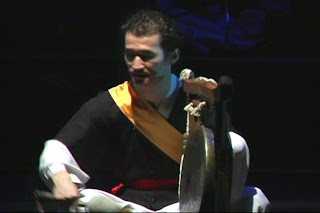Even worse, last year he ALREADY tried to burn another cultural heritage site, to draw attention to his grievance. It seems he went for National Treasure Number 1 because he was further miffed about having to pay fines for trying to burn down buildings in Changgyeonggung palace.
He apologized, and made the "it could be worse" defense, saying, "I was thinking about attacking a subway station, but chose a national treasure instead," which is like a wife beater saying, "you should be thankful: I only hit you with an open hand! Vern next door uses his fist on Marcie!"
Now here's the thing.
It seems like the old forms of protest aren't enough for the crazies anymore.

I mean, back in the good old days, if you had no other options and nobody was listening to your complaints, most people simply participated in self-destructive behaviour -- get drunk, ramble onerously about "The Man" for a while, say bad things about whichever scapegoat you've chosen to bear the blame for your own disappointments, and get on with life. Maybe throw in some passive aggressive law-breaking -- "Ha! I never wear my seat belt, because, damn the man!" "I call police officers 'pig' behind their backs" "I don't declare all my extra income." "I litter. . . mwahahahahaaaa"
But in our hypersaturated information age, that stuff just isn't enough anymore. People want a stage. In feudal Japan, seppuku, or ritual suicide, was a very honourable way to add gravity to one's protest, or to avoid shame in death, in the case of being captured or defeated in battle. Nowadays, a suicide doesn't even make it into a big city's newspaper pages, unless it's a particularly heartbreaking case, and probably one that also happens to fit the political agenda of the right (or wrong) political commentator/journalist/moralist/loudmouth.
So what do the crazies do? The ones that want a stage? I mean, to regain a few moments of power, in the face of all the powerlessness, what do the disenfranchised have to do these days, for someone to validate their complaint, to vent their rage and impotence?
(warning: this is a clip from fight club. it's kinda graphically bloody)
Destroy something beautiful.
Destroy something priceless, something precious. It's not enough anymore for me to drink myself into oblivion and drown in my self-pity. Now, I have to get revenge at the world. Columbine, Virginia Tech, WTC, burning Korea's National Treasure -- finally, they know they exist, I guess. They got their names in the newspaper.
And how many of these kinds of unnecessary, wanton tragedies could have been prevented, if people had listened to those on the margins, and how many of them were the inevitable acts of deeply disturbed minds who were completely out of touch with reality? I don't know. I don't know the role of mental disease in these cases, I don't know if each of these people could have turned a corner, if the right words, or the right kind of compassion, had come along at the right time. I don't know which of these were simply the outward expression of an intense, black hole of hate inside somebody's soul, and I certainly don't know how those deep black holes got there in the first place, and (this is the hardest part) I don't know which disenfranchised group will be the next to lash out. Nobody does -- that's the scary thing. While everybody's trying to reach out to The Muslims, there could well be an abandoned and ostracized Vietnam Vet polishing his rifle; while we're thinking of Cho Seung-hui (Virginia Tech shooter) and trying to reach out to maladjusted immigrants, some member of the uneducated, working poor, helpless to stanch the bleeding of his credit card debt on his mortgage-crippled sub-sustenance-level income, or some salaryman whose health insurance company won't give him a friggin' break, buys a cannister of gasoline and a lighter, and heads for the nearest administrative building. Who's to say?
And a lot of these things CAN'T be prevented. You'll never eradicate school bullying. Racism will continue to be felt (whether imagined or not) and victim mentalities will continue to fester, as long as there are groups of people who look different, or act different, or talk differently, from other groups. The powerful will always prey on the powerless, and the powerless will grow angry (the only prerogative left to them).
Now I'm not some kind of communist, but I do think that the measure of a society, and, I suppose, of our entire race in the end, is not the level of opulence the rich enjoy, but the degree to which our most powerless are respected as humans (all these bartletts regulars seem to concur). Dostoevsky's (possibly apocryphal) quote states that "The degree of civilization in a society can be judged by entering its prisons."
Who knows. Maybe the revolution is coming. Maybe things will mostly stay the way they are, and maybe there are some people who will never be satisfied, who will always find excuses to feed their anger, instead of trying to live beyond it. Maybe such people will always want to take something with them when they go, and for all they care, having their name and face in the newspaper for a day, having everybody know exactly WHY they in particular are angry, is more important than any other person's life or treasure.
If that's true, there's nothing we can do to stop those kinds of crazies from continuing to appear out of nowhere, and making the world suck for a day, or a week, or a two-term presidency and maybe more (thanks, for that, Osama. You dick.) For my part, I just hope I can treat the people I encounter as humans, and as worthy of dignity, so that even if I can't stop the helpless/angry/crazies, I'll know I'm not helping to make more of them.



































